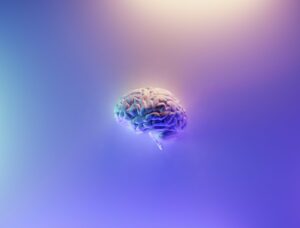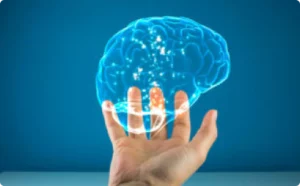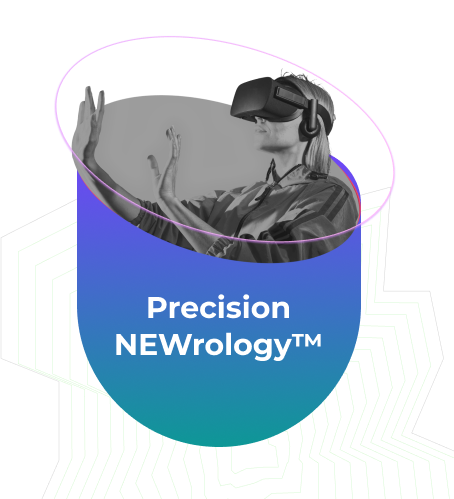
The Race against Long COVID
Apart from the horrifying statistic of more than six million deaths from COVID-19 worldwide, one of the most troubling outcomes of the disease has been the surfacing of Long COVID now affecting a subset of its survivors. With a recent Lancet study reporting that as many as 35% of those who recover from an initial bout of COVID go on to develop Long COVID, the race to better understand the causes and neurological effects of this lingering disease is well underway.
Individuals with Long COVID may experience a range of troubling symptoms including difficulty concentrating, lapses in memory, and sleep disorders, all also hallmarks of Alzheimer’s disease. Depression and “brain fog” are also often reported by patients with both conditions. And alarmingly, incoming research indicates that Long COVID can cause the brain to age ten to twenty years, increasing the risk of developing dementia and Alzheimer’s.
The clue in the cells
The pathogenesis and cognitive symptoms of Long COVID are similar to those of Alzheimer’s disease with good reason: in Long COVID, neuroinflammation can cause phosphorylated tau—one of the key proteins that causes Alzheimer’s—to accumulate in brain cells. In addition, the symptom of hyposomia, the inability to smell and taste, is also prevalent in both diseases. These links have even led some researchers to theorize that Long COVID could actually be a form of Alzheimer’s, although more studies are needed to confirm this possibility.
Further research will need to expand on the findings of these early studies to better understand the impact of Long COVID on different areas of the brain. The digital health and artificial intelligence company ViewMind has been using a digital biomarker to detect the presence of Alzheimer’s-related proteins, tau and beta-amyloid, in the brain long before traditional diagnostic methods. ViewMind is now embarking on a project that will employ the same digital biomarker—eye movement patterns—to better understand the pathology of Long COVID.
Partnering for innovation
In partnership with the Luxembourg Institute of Health, ViewMind has been awarded a 1.36 million euro grant from the Luxembourg Ministry of the Economy, the Luxembourg National Research Fund, and Luxembourg’s National Innovation Agency, Luxinnovation, to study the neurocognitive effects of Long COVID. The grant was one of four awarded to projects submitted to Luxembourg’s first Joint Call for HealthTech Projects, an initiative that focuses on the use of digital health technologies to help diagnose, treat, and prevent disease.
The joint call aims to create public-private partnerships that will provide resources for health technology companies to validate their products through technical and clinical trials before launching their products to the market. ViewMind recently concluded a longitudinal study that studied the ability of its proprietary eye-tracking AI software to determine whether patients with mild cognitive impairment (MCI) would later develop Alzheimer’s. After discovering that this highly sensitive technology accurately predicted conversion to Alzheimer’s in 94 percent of participants, ViewMind now has the opportunity to test the efficacy of its technology in detecting Long COVID.
The eyes have it
In ViewMind’s three-year study, which monitored individuals with MCI alongside a control group, participants performed short tasks on a computer that required them to remember patterns of color in shapes they had been asked to view. Monitoring the patterns of eye movement and pupil response during this activity confirmed a clear biomarker for Alzheimer’s that led to near-perfect predictive accuracy.
Current methods of diagnosing Alzheimer’s typically detect the disease years or even decades after it has begun to develop. The reasons for this are threefold: patients often do not seek diagnosis until symptoms are grave; Alzheimer’s symptoms are often hard to distinguish from the signs of normal ageing, and health care currently does not include routine preventive cognitive health scans that might detect neurocognitive diseases in their early stages. ViewMind’s technology holds the promise to change all that.
The accuracy of ViewMind’s digital biomarker introduces the possibility of early detection and intervention for a variety of neurocognitive disorders, including Long COVID. The easier it is to trace the breadcrumbs of a disease’s symptoms to a definitive biomarker, the more likely it is that researchers will be able to secure funding to study it further and forge a path to treatment and prevention.
A new frontier
Although early intervention and treatment solutions for Alzheimer’s disease are as yet underdeveloped, the disease has been front of mind in the global consciousness for decades, a frequent subject of medical research. On the other hand, COVID-19, and the consequent Long COVID, are entirely new conditions that the research community is still working to define and treat. ViewMind’s mission to create an easily accessible, affordable, and noninvasive assessment for a variety of cognitive disorders holds great promise for identifying and treating conditions—whether longstanding or recently emergent—in their early stages.
Related Posts

How do we know when mild cognitive impairment (MCI) will become Alzheimer’s?
Cognitive impairment is a multifaceted ailment that has long bedevilled researchers due to the unpredictable nature of its progression. Some individuals with mild cognitive impairment…

Why is an earlier diagnosis of Alzheimer’s disease key to flattening the growth curve of rapidly escalating patient populations?
Alzheimer’s disease, the leading cause of dementia, is notoriously difficult to diagnose in its initial stages. This is one reason that numbers of Alzheimer’s cases…


